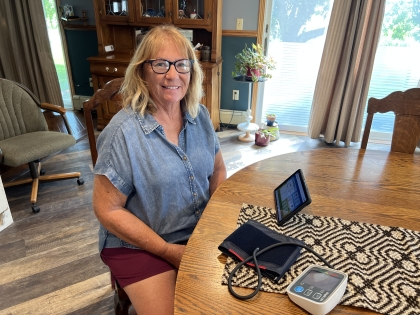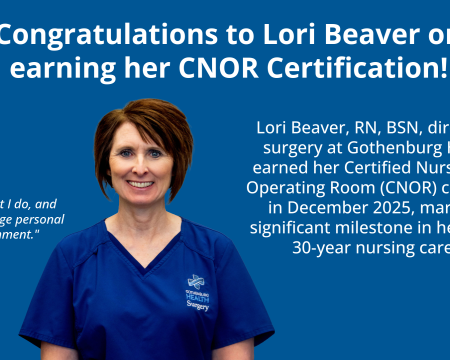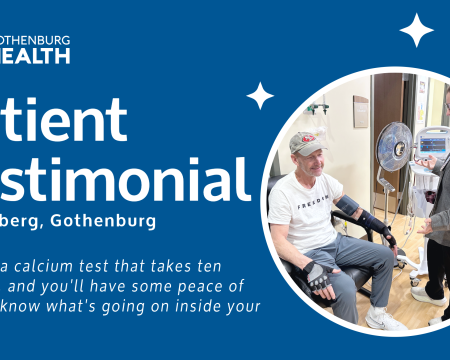
Gothenburg Health’s Remote Monitoring Program Empowers Patients at Home
Patients with chronic conditions like heart failure, high blood pressure, or diabetes can now manage their health from home through Gothenburg Health’s Remote Patient Monitoring (RPM) program. Using digital devices, the system tracks vital signs and securely sends the data to a care team—no clinic visit or video call required.
RPM benefits both patients and providers. Patients gain insights into how daily habits impact their health and can often avoid unnecessary appointments. Providers receive real-time data, enabling faster decisions and helping prevent complications.
Gothenburg resident Mary Finke said the program has been life-changing after high blood pressure was discovered during a routine checkup.
“This has been one of the best things that’s happened to me,” Finke said. “I wasn’t taking my blood pressure seriously—and I needed to. Now we can work on it. Good things are going to come out of this program.”
The goal of RPM is to help patients stay safe and independent while giving healthcare providers a more complete picture of daily health. If a reading falls outside the normal range, the care team is alerted and can respond—sometimes even recommending emergency care.
Patients receive a kit tailored to their needs, which may include a blood pressure cuff, scale, pulse oximeter, or blood sugar monitor, along with a Samsung tablet that works without Wi-Fi. The system is simple and age-friendly. While some may feel hesitant about new technology, help is always available.
“It really is simple to use,” said Ana Myers, Community Health Navigator. “And if patients ever need help, we’re here to walk them through it.”
Patients typically use the devices daily—sometimes more often—to monitor their health. The data is automatically transmitted to the care team, making it easy to stay connected. The RPM team reviews this information and communicates directly with the provider, so when patients come to their routine appointments, their doctor already has a clear picture of their day-to-day health.
“We solved a problem without the patient ever leaving home,” Myers said. Through consistent use of RPM and provider-guided adjustments, patients have seen improvements in a variety of chronic conditions—from blood pressure and blood sugar to weight and oxygen levels. While some may only need the program for a few months, others may stay enrolled longer depending on their condition and their provider’s recommendation. The program is designed to support each patient with personalized care and real-time insights that lead to better, more sustainable health outcomes.
“I’m so pleased Gothenburg Health introduced me to this program,” Finke added. “It’s simple—but we need to take high blood pressure seriously. Dr. Dalrymple and the staff are part of this journey, and I appreciate that very much.”
The RPM program is currently available to Medicare patients with qualifying conditions. Expansion to other patients may be possible later through a special approval process. Medicare Advantage plans are not accepted at this time.
RPM provides a more complete view of a patient’s daily health—not just what’s seen in the clinic. It can also help reduce “white coat syndrome,” where patients experience elevated readings due to anxiety during appointments.
Simple, supportive, and effective, the RPM program helps patients stay healthy, safe, and independent—all from the comfort of home.






